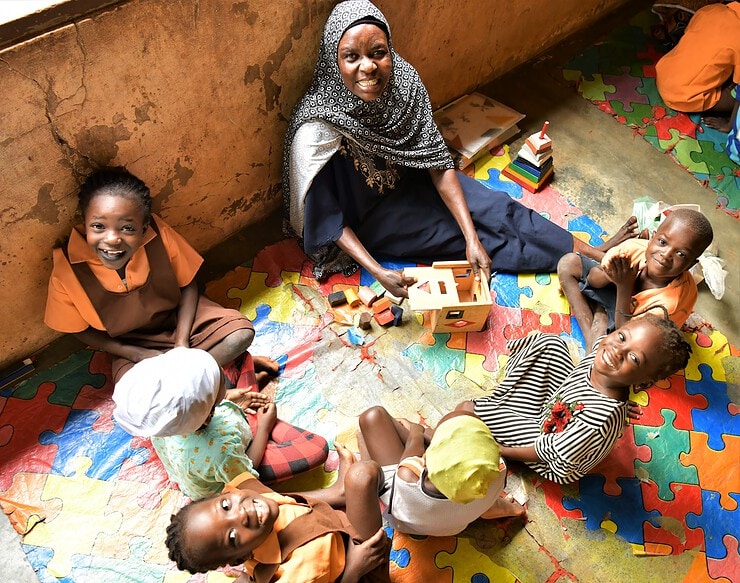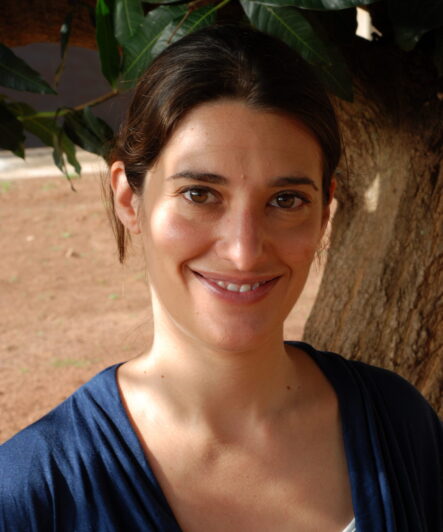Empowering rural parents to help young children thrive
Parents in rural communities can help drive child development and transform their children’s futures

Shifting parenting mindsets and practices is the missing piece to transforming children’s learning and development, says Alison Naftalin of the NGO Lively Minds. Alison talks with Aisha Schnellmann about why improving holistic early childhood development in underserved rural communities is crucial and how empowering parents with the confidence and support to provide quality care and learning is the best way to bring about change.
Aisha Schnellmann: What are the biggest challenges facing children around the world?
Alison Naftalin: Children need quality care and education in early childhood to reach their full potential. Yet 250 million children globally, particularly those in deprived rural communities, are being left behind. This gap has a serious impact on their health, socio-emotional development, and access to future economic opportunities.
Despite the pressing need, support for early childhood development worldwide remains chronically underfunded, with little urgency to address the crisis. Private-sector solutions are often unaffordable and unregulated, and public preschools, though established in some areas, require a trained workforce and infrastructure, which can be costly and take time to implement. As a result, the quality of education is often most compromised in remote areas.
“All children need a whole-child focused approach to care and education.”
AS: What do children need to help them thrive?
AN: All children need a whole-child focused approach to care and education, from birth to nurture their cognitive, socio-emotional, language, and physical development. In practice, this includes a variety of essential inputs such as:
- Play-based learning and stimulation
- A nutritious, balanced diet
- Responsive caregiving
- Protection from diseases and hazards
- Adequate sleep and exercise
- Opportunities for social interaction
- Exploration and understanding of the world
- Engaging in conversations, storytelling, singing, and asking questions
There is no one-size-fits-all solution to ensure that every child has access to these opportunities; approaches must be context-specific.
AS: How is the work of Lively Minds helping children in Ghana and Uganda?
AN: At Lively Minds, we focus on empowering rural communities to provide their own early childhood development initiatives, adopting a whole-child approach. In rural areas, where children spend at least 75% of their time at home, parents have the greatest potential to shape their child’s development. Unfortunately, many parents struggle to provide quality care and education, owing to a lack of confidence and resources.
We believe that the best way to spark change is to enable parents to see themselves as capable and valued caregivers. We do this by providing them with the information, confidence, and support they need to offer quality learning and care using the resources they already have. It is not a complete solution, but it is a vital springboard.
“We believe that the best way to spark change is to enable parents to see themselves as capable and valued caregivers.”
We help parents to understand the critical importance of early childhood development and to recognise that despite poverty and limited education, they have the power to make a huge difference in their children’s lives. Parents can create nurturing, stimulating environments for their children with simple, effective practices. Our approach involves training mothers to run Play Schemes for 3- to 6-year-olds in their communities and equipping them with better caregiving and learning practices through parenting workshops and a radio programme. The programme is delivered through existing government systems, allowing it to be scaled up widely, affordably, and sustainably.
In Ghana, the programme is delivered through the state kindergarten system, and it not only enhances parenting skills but also improves the quality of play-based learning in classrooms. And where there is no pre-primary provision, the programme provides a community solution. This is the case in Uganda, where – because there are no kindergartens – the programme is implemented under trees, where it is easy for the community to gather. In the same spirit of flexibility, the programme is carried out in Ghana by the Education Services, but in Uganda by the Health Services, in each case relying on the State stakeholders best positioned to implement the model at the local level.
Currently, the programme reaches about 125,000 mothers and over 320,000 children weekly across 3,500 villages in Ghana and Uganda. A randomised controlled trial found that although 93% of mothers in the programme were illiterate, their commitment and efforts led to significant learning gains in their children’s literacy, numeracy, and cognition equivalent to an additional year of schooling, and to enhanced nutrition and socio-emotional skills.
Our vision is of a world where all children receive the care and education they need to thrive.
AS: What has inspired you in this work?
AN: At Lively Minds, we are continually inspired by the dedication of the parents in our programme, driven by their desire to create a better future for the next generation in their communities. Their commitment extends beyond their own households, as they share what they have learned with peers outside the programme, creating a ripple effect across huge parts of rural Ghana and Uganda. It’s especially rewarding to witness mothers growing in confidence, improving their standing within the community, and experiencing better mental and emotional wellbeing as a result of their involvement.
Footnotes
Alison Naftalin founded Lively Minds in 2008 and spent 5 years working directly with caregivers in rural communities in Ghana and Uganda to design the programme, making sure that it was context-appropriate and sustainable. She then turned her attention to finding ways to scale the programme, focussing on integrating it into government systems and structures. Alison leads a team of over 100 staff and has succeeded in getting the programme adopted by the government of Ghana, integrated into policy, and scaled to include over a third of rural communities.
Lively Minds is a finalist for the 2024 Klaus J. Jacobs Best Practice Prizes, which recognize institutions and individuals who are working to implement evidence-based solutions aimed at promoting child development and learning in practice.
This interview has been edited for clarity.

